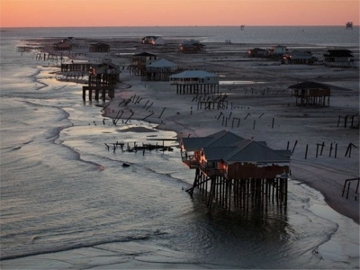Le support de ces exercices, qui
sont libres d'accès et gratuits, est un article
paru en janvier 2010 dans le journal The
Independent : 1. Exercices de compréhension orale : a - Ecoutez cet article deux ou trois fois. Il est
très souhaitable de ne pas lire le script
ci-dessous lors de cet exercice. |
 The effects of hurricane Katrina |
b - Answer the questions, and check your
answers by hovering your mouse over 'Check'
(vérifiez vos réponses en passant la souris sur
'Check') :
1. What does the new report say? Check
2. What countries are most concerned? Check
3. What danger may we have to survive? Check
4. What does Muhamad Yunus call our current cultures, and
the next ones? Check
5. What is being decimated? Check
6. On what condition may government action succeed? Check
7. Give examples of the new behaviours the report
recommends. Check
8. Why are these recommendations unrealistic, according
to the Global Warming Policy Foundation? Check
c - Give an oral summary of this article. It should last 3 to 4 minutes.
2. Exercice pour améliorer la prononciation et l'intonation en anglais :
Vous allez
maintenez entendre ce même article en 'lecture
éclatée', c'est à dire découpée en membres de
phrases qui font unité de sens.
Si vous en ressentez le besoin, suivez des yeux le script
ci-dessous : chaque ligne est un membre de phrase.
Après chaque membre de phrase (et donc à la fin de
chaque ligne), il y aura un silence de quelques secondes.
Pendant ce silence, répétez le membre
de phrase que vous venez d'entendre.
ATTENTION : ne vous laissez pas 'influencer' par
l'orthographe, et REPETEZ EXACTEMENT ce que vous avez
entendu, en reproduisant, non seulement la prononciation
des mots, mais aussi l'intonation du
membre de phrase.
A terme, il vaut mieux faire ces répétitions
sans lire le texte : c'est le but à atteindre.
Mais, si vous en ressentez le besoin, le voici
ci-dessous.
Lancez cette lecture éclatée.
THE END
OF CONSUMERISM: |
And
any actions taken by governments, or scientific advances to deal with climate change, are doomed to failure unless individuals get back to a basic way of life, concludes the report which recommends things like borrowing books and toys from libraries instead of buying them, choosing public transport over the car, and growing food in community gardens. All products should be designed to last a lifetime and be completely recyclable. To thrive
long into the future, |
Très
bientôt, seront en ligne d'autres articles servant de
supports à vos exercices.
Pour toute question, contactez-nous.
Bon travail.